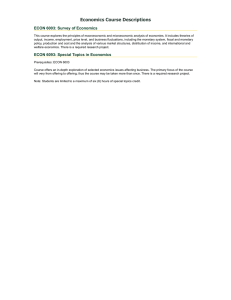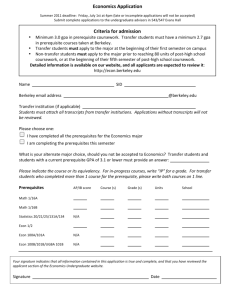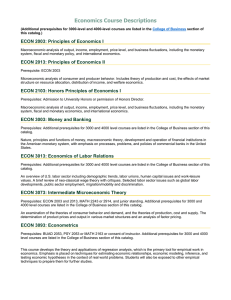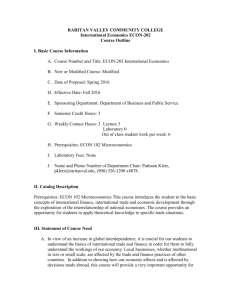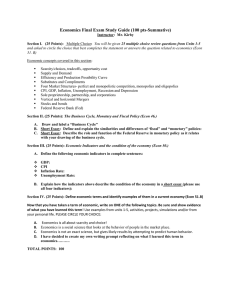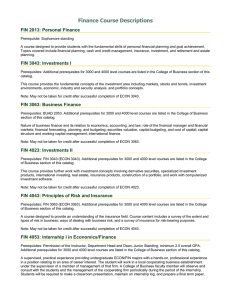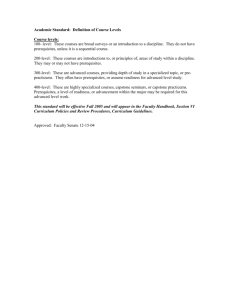Economics Course Descriptions ECON 2003: Principles of Economics I
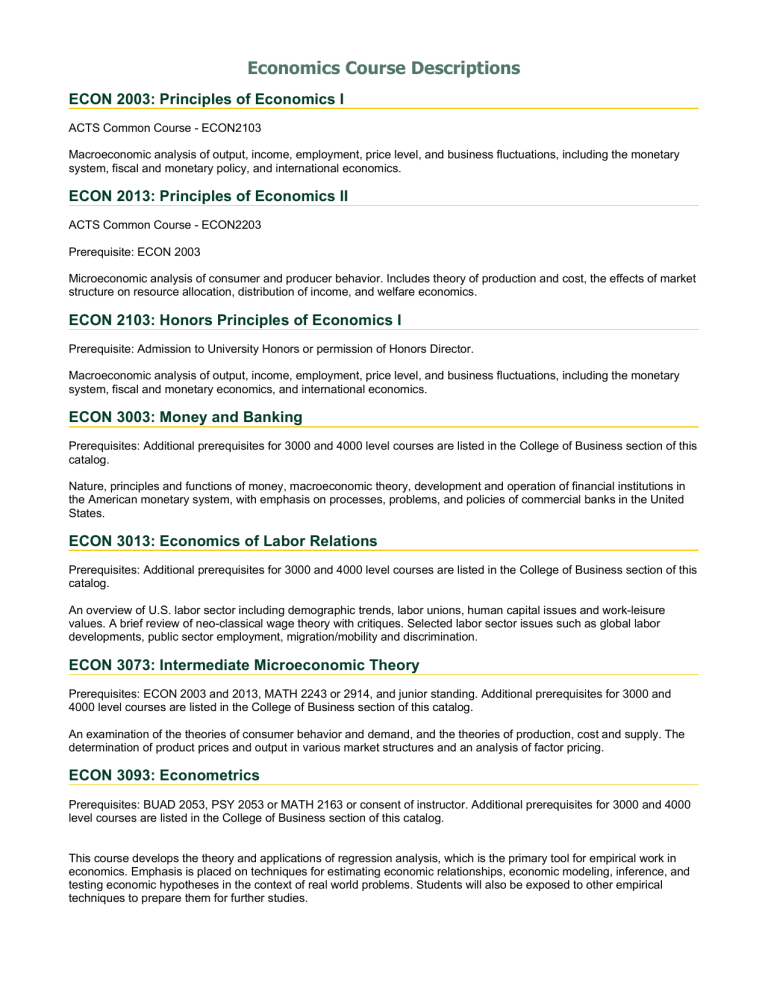
Economics Course Descriptions
ECON 2003: Principles of Economics I
ACTS Common Course - ECON2103
Macroeconomic analysis of output, income, employment, price level, and business fluctuations, including the monetary system, fiscal and monetary policy, and international economics.
ECON 2013: Principles of Economics II
ACTS Common Course - ECON2203
Prerequisite: ECON 2003
Microeconomic analysis of consumer and producer behavior. Includes theory of production and cost, the effects of market structure on resource allocation, distribution of income, and welfare economics.
ECON 2103: Honors Principles of Economics I
Prerequisite: Admission to University Honors or permission of Honors Director.
Macroeconomic analysis of output, income, employment, price level, and business fluctuations, including the monetary system, fiscal and monetary economics, and international economics.
ECON 3003: Money and Banking
Prerequisites: Additional prerequisites for 3000 and 4000 level courses are listed in the College of Business section of this catalog.
Nature, principles and functions of money, macroeconomic theory, development and operation of financial institutions in the American monetary system, with emphasis on processes, problems, and policies of commercial banks in the United
States.
ECON 3013: Economics of Labor Relations
Prerequisites: Additional prerequisites for 3000 and 4000 level courses are listed in the College of Business section of this catalog.
An overview of U.S. labor sector including demographic trends, labor unions, human capital issues and work-leisure values. A brief review of neo-classical wage theory with critiques. Selected labor sector issues such as global labor developments, public sector employment, migration/mobility and discrimination.
ECON 3073: Intermediate Microeconomic Theory
Prerequisites: ECON 2003 and 2013, MATH 2243 or 2914, and junior standing. Additional prerequisites for 3000 and
4000 level courses are listed in the College of Business section of this catalog.
An examination of the theories of consumer behavior and demand, and the theories of production, cost and supply. The determination of product prices and output in various market structures and an analysis of factor pricing.
ECON 3093: Econometrics
Prerequisites: BUAD 2053, PSY 2053 or MATH 2163 or consent of instructor. Additional prerequisites for 3000 and 4000 level courses are listed in the College of Business section of this catalog.
This course develops the theory and applications of regression analysis, which is the primary tool for empirical work in economics. Emphasis is placed on techniques for estimating economic relationships, economic modeling, inference, and testing economic hypotheses in the context of real world problems. Students will also be exposed to other empirical techniques to prepare them for further studies.
ECON 4003: Readings in Economic Theory
Offered: On demand
Prerequisites: Senior standing, background of courses needed for problem undertaken and permission of the department head. Additional prerequisites for 3000 and 4000 level courses are listed in the College of Business section of this catalog.
Advanced study on an individual basis is offered in money and banking, public finance, general economics, international trade, labor relations, transportation.
ECON 4033: Current Economic Problems
Prerequisites: Additional prerequisites for 3000 and 4000 level courses are listed in the College of Business section of this catalog.
Emphasis is on a "way of thinking" about current economic problems including a conceptual context, critical thinking and problem solving approaches. Major domestic and global economic trends are reviewed. Current economic issues are selected for evaluation.
ECON 4073: World Economic Systems
Offered: On demand
Prerequisites: Additional prerequisites for 3000 and 4000 level courses are listed in the College of Business section of this catalog.
A study of the institutional framework of an economic system selected by the instructor. The course includes a visit to the country being studied.
ECON 4093: International Economics and Finance
Prerequisites: Additional prerequisites for 3000 and 4000 level courses are listed in the College of Business section of this catalog.
A course designed specifically for economics and finance majors desiring an understanding of the interplay of economic and financial forces between nations. While developing the theoretical base underlying these forces, the course will emphasize practical aspects of cross border flows of goods, services, and capital from the point of view of the firm.
Lecture and discussion will be supplemented by analysis of cases and current events where appropriate. The content of the course should be readily applicable to any private or public sector policy making situation involving an international dimension in which students find themselves.
